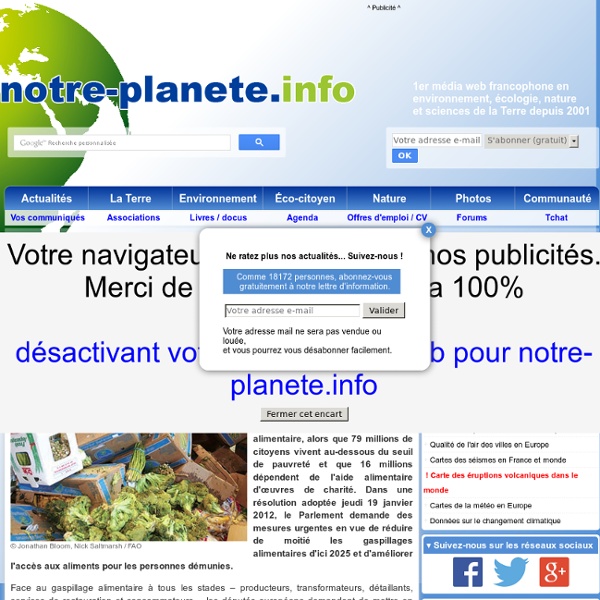



Urgent ! Diviser par 2 le gaspillage en Europe Près 50 % d'aliments sains sont gaspillés chaque année dans l'UE, par les ménages, les supermarchés, les restaurants et la chaîne alimentaire, alors que 79 millions de citoyens vivent au dessous du seuil de pauvreté et que 16 millions dépendent de l'aide alimentaire d'œuvres de charité. Dans une résolution adoptée jeudi, le Parlement demande des mesures urgentes en vue de réduire de moitié les gaspillages alimentaires d'ici 2025 et d'améliorer l'accès aux aliments pour les personnes démunies. Face au gaspillage alimentaire à tous les stades –- producteurs, transformateurs, détaillants, services de restauration et consommateurs – les députés demandent de mettre en place une stratégie coordonnée, associant des mesures européennes et nationales, afin d'améliorer l'efficacité de la chaîne alimentaire et des circuits de consommation, secteur par secteur, et de s'attaquer d'urgence à ce problème. Mieux éduquer pour moins gaspiller Étiquetage et emballage adéquat Origine du gaspillage:
Des livres , des sites pour sortir du capitalisme d'exploitation Editions Yves Michel contact Découvrez les dernières actus du Blog Le forum Économie et Spiritualité s’est tenu à l’Institut bouddhiste tibétain Karma Ling (Savoie) en septembre 2011, sous le parrainage d’Edgar Morin et Pierre Rabhi. L’objectif du forum était de favoriser la communication et la coopération entre des personnes de sensibilités différentes autour de projets d’avenir fondés sur une vision éthique, spirituelle, humaniste et écologique de l’économie. Nombre de thématiques ont été abordées, entre autres : une approche bouddhiste de la crise économique, l’Islam et économie face à la crise : le système bancaire islamique ; l’entreprise sociale face à la crise, de nouvelles formes monétaires, pour une économie de la compassion, la finance éthique, remède à la crise ; le commerce équitable… Il s’agit, à la lumière de la retranscription de ce forum, de faire émerger un plan d’action pour remédier à la crise dans un réseau de coopération solidaire. Participants de ce forum :
Dossier de presse Le gaspillage alimentaire, scandale environnemental et social Yaourts, viande, plats préparés… En un an, chaque Français jette en moyenne 7 kg de produits encore emballés, non entamés [1] ! Un chiffre qui ne tient pas compte, à titre d’exemple, du pain rassis, des fruits et légumes avariés, des restes cuisinés. Le gaspillage alimentaire représenterait ainsi au minimum une vingtaine de kilos de déchets par an et par personne. Un scandale environnemental, social et sanitaire Pertes de productivités, pertes pendant le stockage, gaspillage… Ce sont donc plus de la moitié des terres agricoles qui sont exploitées inutilement à cause du gaspillage alimentaire. Jeter de la nourriture c’est aussi surcharger les incinérateurs et les décharges. Le gaspillage alimentaire n’est pas une fatalité Le gaspillage alimentaire généré par la grande distribution, la restauration, les ménages, sont des déchets évitables par une meilleure gestion des aliments, de leurs filières et de leur réseau de distribution. Télécharger ce communiqué en format PDF.
(5) PODBETE versus... Deux guides pour mieux s'alimenter et recycler ses déchets L’association Passerelles.info a développé deux programmes d’éducation, à destination des classes de 1er et 2nd cycle, pour lesquels le Ministère de l’agriculture a accordé son haut patronage. Les enseignants souhaitant organiser des activités pédagogiques sur les thèmes de l’alimentation, du sport et du recyclage des déchets peuvent demander gratuitement leur guide. Apprendre à manger bien et bon, pratiquer une activité physique, recycler ses déchets... des actes quotidiens et citoyens dont l’apprentissage débute souvent dès le plus jeune âge. Cette année, l’association Passerelles.info [1] renouvelle ses guides à destination des enseignants. Le premier guide « Manger, bouger pour ma santé » s’inscrit dans la continuité des programmes de santé public, mis en place dès 2001 avec le Programme national nutrition santé du Ministère de la santé. Le second guide « Réduire mes déchets, nourrir la terre » poursuit le travail. Deux guides complets et gratuits Voir aussi : Notes
(5) Appel à l'homme blanc de Oren Lyons, Indien Iroquois Onondaga, écrit au début des années 1980. Notre mode de consommation, guidé par l'esthétisme ? Atlantico : Notre alimentation est-elle essentiellement régie par l'esthétisme? Jean-Pierre Corbeau : Je ne pense pas qu'aujourd'hui notre alimentation soit gérée essentiellement par l'esthétisme. A moins que l'on considère le packaging de produits transformés comme forme d'esthétisme et que l'on affirme qu'il est déterminant dans l'acte d'achat (ce qui ne se vérifie pas dans les enquêtes menées à ce sujet). On arrive alors à une sorte de paradoxe, les légumes ou les fruits les moins chers (ceux dont on a du mal à connaître l'histoire - provenance, type de production, type de conservation, etc.) qui ne possèdent pas de signe de qualité particulier sont ceux qui doivent- esthétiquement être irréprochables. Faut-il réhabituer les personnes à manger bon et non beau ? Je pense qu'il faut habituer les gens à manger bon et à être acteurs de cette alimentation en participant à la réalisation de celle-ci. Je pense avoir montré que tout le monde ne cherche pas le visuel.
Et si la physique quantique expliquait les expériences de mort imminente ? Les expériences de mort imminente passionnent les scientifiques comme le reste de la population. Il y a encore trois semaines, l'histoire d'Eben Alexander, ce grand neurochirurgien qui racontait son expérience de vie après la mort dans le livre Proof of Heaven ("Preuve du paradis") faisait la Une de nombreux journaux. Mais une question demeure : comment et quand est-ce qu'arrive ces expériences de mort imminente ? Selon les deux experts, la conscience serait donc une sorte de programme pour un ordinateur quantique contenu dans le cerveau et qui persisterait dans l'univers après la mort d'une personne, expliquant donc les perceptions, les impressions des hommes et femmes qui vivent des expériences de mort imminente. Stuart Hameroff expliquait ainsi dans un documentaire : "Disons que le cœur cesse de battre, le sang s'arrête de circuler, les microtubules perdent leur état quantique. Lu sur The Daily Mail